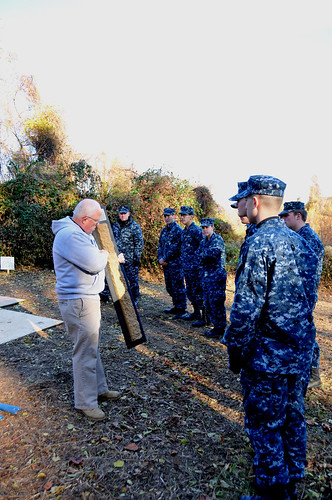
In the middle of the Broadneck Peninsula in Cape St. Claire sits a part of Maryland history that was neglected until a few years ago. The empty house resting on 30 acres was once part of Goshen Farm, a working farm that nearly covered the entire peninsula. Corn, wheat, beets, buckwheat and cabbage, as well as food for oxen, cows, pig, sheep, horses and mules grew abundantly, nourished by the rich and healthy soil.
Now, USDA’s Natural Resources Conservation Service (NRCS) is working with the Goshen Farm Preservation Society, Inc. to protect this farm – and put it back to work. NRCS and the society want to raise awareness of the importance of healthy soils for long-term, sustainable agricultural production, and Goshen Farm is the perfect place.
“It’s easy to take soil for granted because it’s mostly hidden from view—and few who live off the farm have reason to give it a second thought,” said Dean Cowherd, a NRCS soil scientist in Maryland. “Goshen Farm is now surrounded by houses and other development. The land offers a great teaching opportunity to understand soil health and its local significance.”
This lesson is more important in a world with a growing population and demands on food, Cowherd said.
Healthy soils are more productive, and conservation practices offered by NRCS help farmers, ranchers and forest landowners protect natural resources both on and off the farm. Healthy soil loses less water because of runoff and evaporation, a critical issue in the Chesapeake Bay area.
Recently, 10 U.S. Naval Academy midshipmen volunteered to further the preservation of Goshen and learn about conservation and soil. The midshipmen’s strong work ethic and dedication to the community started an ongoing partnership to understand soil health and its local significance.
Using an engineering drawing as their guide, the midshipmen dug a soil pit that demonstrates the complexity of soil. The thickness, color and texture of each soil horizon or layer hold important information that aids land use decisions. Healthy topsoil is darker in color, crumbly and porous, and it has a sweet and earthy aroma and is easy to dig into.
“Volunteering gives us the opportunity to break from our normal routine at the academy and learn more about the community around us,” said Cesar Segura, the lead mid-shipmen for the project.
The midshipmen also helped to clear invasive vines and trees in a field where a barn once existed. Their hard work uncovered a silo foundation and parts of the barn’s floor. With the brush cleared, NRCS will use its ground penetrating radar technologies for further underground analysis of items buried long ago. These discoveries will help the society continue to weave together the history of the farm.
Goshen Farm sits adjacent to the Cape St. Claire Elementary, and the Anne Arundel County Board of Education owns it. It offers the opportunity to incorporate hands-on soil health education into environmental literacy programs.
The soil pit dug by the midshipmen will remain a permanent fixture on the property, allowing the neighboring schoolchildren and other members of the community to see the complex soil beneath their feet.
The Goshen Farm board and NRCS are reviewing new Maryland Environmental Literacy standards so that outdoor education on the farm can complement local teacher’s curricula.
“What success we saw was a result of our various partners working together to achieve our goals,” said Roy Benner with the society. “We have only begun to reap the benefits from this relationship.”

